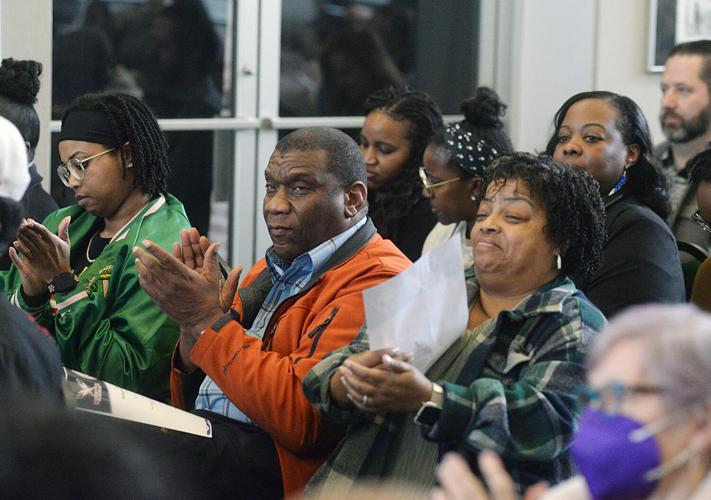
- Details
- By Chuck Hoskin Jr
Guest Opinion. Cherokees are one people, and all Cherokee Nation citizens deserve equal treatment under our laws and the laws of the United States. That firm commitment to equality is clear in the Cherokee Nation Constitution, our tribal statutes, and the Executive Order on Equality that I first put forward in 2020 and expanded this year. All of these are firmly rooted in Cherokee values.
As a tribal nation, we have made great strides in fully including our citizens of Freedmen descent. In doing so, we are living up to our ideals as a nation and our treaty commitments to the United States. Since the McGirt decision finally recognized tribal and federal jurisdiction, Cherokee Nation has been empowered to enforce our laws and protect citizens across our reservation.
Unfortunately, federal law continues to deny equal rights to all Cherokees. The Major Crimes Act of 1885 has been interpreted in a way that discriminates against our Freedmen citizens, requiring them to have “Indian blood” to access federal courts. That interpretation goes against our values and ignores the principle that tribal sovereignty is based on citizenship, not race.
That’s why Cherokee Nation is seeking amendments to the outdated Major Crimes Act. We are calling on Congress and the courts to undo the historical injustices faced by our Freedmen citizens in the federal justice system.
It is unacceptable that Cherokees of Freedmen descent can be dragged into state court, with their status as Cherokee Nation citizens completely disregarded. In the 21st century, we should have moved beyond the discredited notion of "separate but equal." Since the historic 1954 Brown v. Board of Education decision, we have known that "separate but equal" is inherently unequal. We believe in a Cherokee Nation as our ancestors envisioned, where every citizen is truly treated equally.

To be clear, Cherokee Nation law and jurisdiction, including criminal law, applies equally to all citizens, including those of Freedmen decent. But federal law and jurisdiction has a unique role in Indian Country law and justice. And, state law and jurisdiction is excluded. Yet, the federal government excludes Cherokee citizens of Freedmen descendant from that unique aspect of federal law. It is unacceptable.
Cherokee Nation and the U.S. government are also bound by the 1866 Treaty, which granted Freedmen "all the rights of native Cherokees." Federal court rulings in 2017 and decisions by the Cherokee Nation Supreme Court have affirmed that Freedmen descendants are full Cherokee citizens under the law.
Our exercise of tribal sovereignty is rooted in recognizing all those who descend from the Cherokee portion of the Dawes rolls, including Freedmen descendants, as full tribal citizens. It is not just about legalities; it is about upholding the wishes of our ancestors and ensuring that every citizen, regardless of their background, enjoys equal protections in voting, running for office and services laid out in the Cherokee Nation Constitution.
We will not rest until the United States catches up with the spirit of equality and justice that defines the Cherokee Nation. We stand united against injustice, advocating for the fulfillment of promises made by our ancestors.
Chuck Hoskin, Jr. is principal chief of the Cherokee Nation.
More Stories Like This
Tribes Seek Better Data, Real Accountability in MMIP Cases Ahead of Tribal ConsultationWhat Would Dr. King Say About ICE?
In Unity and Commitment
Protecting Our People through Human Trafficking Awareness
It is Time for Animal Behavior to Become Its Own Discipline
Help us defend tribal sovereignty.
At Native News Online, our mission is rooted in telling the stories that strengthen sovereignty and uplift Indigenous voices — not just at year’s end, but every single day.
Because of your generosity last year, we were able to keep our reporters on the ground in tribal communities, at national gatherings and in the halls of Congress — covering the issues that matter most to Indian Country: sovereignty, culture, education, health and economic opportunity.
That support sustained us through a tough year in 2025. Now, as we look to the year ahead, we need your help right now to ensure warrior journalism remains strong — reporting that defends tribal sovereignty, amplifies Native truth, and holds power accountable.
 The stakes couldn't be higher. Your support keeps Native voices heard, Native stories told and Native sovereignty defended.
The stakes couldn't be higher. Your support keeps Native voices heard, Native stories told and Native sovereignty defended.
Stand with Warrior Journalism today.
Levi Rickert (Potawatomi), Editor & Publisher

